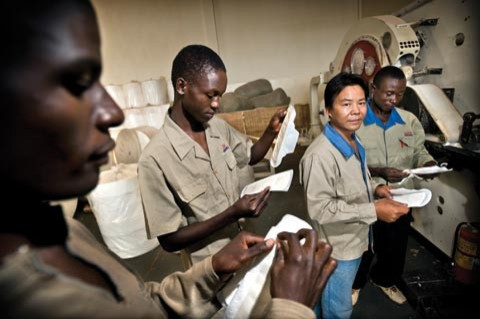Ugandan Traders Strike to Protest High Prices, Influx of Asians

A strike in Kampala, Uganda may reflect the growing uneasiness of Africans with having Asian traders in their midst.
Shopkeepers in the Ugandan capital have commenced a two-day work stoppage in order to express their dismay against rising fuel and commodity prices, an unstable foreign exchange rate and the increased competition from Chinese and Indian businessmen who have flooded the market with cheap goods.
Stores have also closed down in other towns, including Masaka in the southwest.
Everest Kayondo, chairman of the Kampala City Traders Association (KACITA) said in a statement: KACITA considers the following issues, amongst other, as pertinent in the economy; high exchange rates, high taxes, high prices, government expenditure, investment pattern, license, and foreigners engaging in petty trade. Government intervention is required in the foreign exchange market to control the upswing in the foreign exchange.”
Anti-riot police have been dispatched throughout the city to maintain order.
All people involved in business and trade have closed their shops. We as leaders are ready for any eventuality. We expect the government not act like a rebel government, Mubarak Ntale, KACITA’s deputy spokesperson told DPA, the German news agency.
Since this is a peaceful demonstration, we do not expect the demonstrators to be mistreated by the police. Our demonstration is to express what we are going through, especially the escalating prices.
Protests against Ugandan President Yoweri Museveni, who was just re-elected to another five-year term in February, have been intensifying, prompted primarily by inflation. The prices of such staples as sugar, rice and grain have surged.
In April and May, rallies by Museveni’s opponents turned violent, even resulting in some nine deaths.
Small businessmen have urged the government to intervene on the rising price issue.
According to New Vision, the state-owned Ugandan newspaper, the country’s Trade and Industry Minister Amelia Kyambadde held a six-hour meeting with the shopkeepers in which she asked them to call of their protest, at the urging of president Museveni.
Another spokesman for KACITA, Issa Sekito, told BBC: The [Ugandan] shilling is too weak against the dollar and, while there are global factors, there are internal ones, too.”
The Ugandan shilling suffered a particular plunge recently when rumors floated that the country’s central bank governor Emmanuel Tumusiime Mutebile has resigned.
Sekito added: Over the years, we have been complaining to government over the aliens doing petty trade, especially the Chinese -- who come in as investors.”
A Kampala resident, Linda Ssempijja, told Reuters: It is hard, hard to live now because things are too expensive. But I don't blame the shopkeepers. They are suffering, too. I blame the government.”
The resentment of Asian businessmen in sub-Saharan Africa is a sensitive subject with some dangerous precedent. In 1972, the president of Uganda Idi Amin deported 90,000 Asians (mostly Indians of Gujarati descent). Similar events (although on a smaller scale) have also occurred in Kenya, Tanzania and elsewhere.
However, it seems now the Chinese trader has replaced the Indian as the primary target of resentment among Africans.
© Copyright IBTimes 2025. All rights reserved.





















